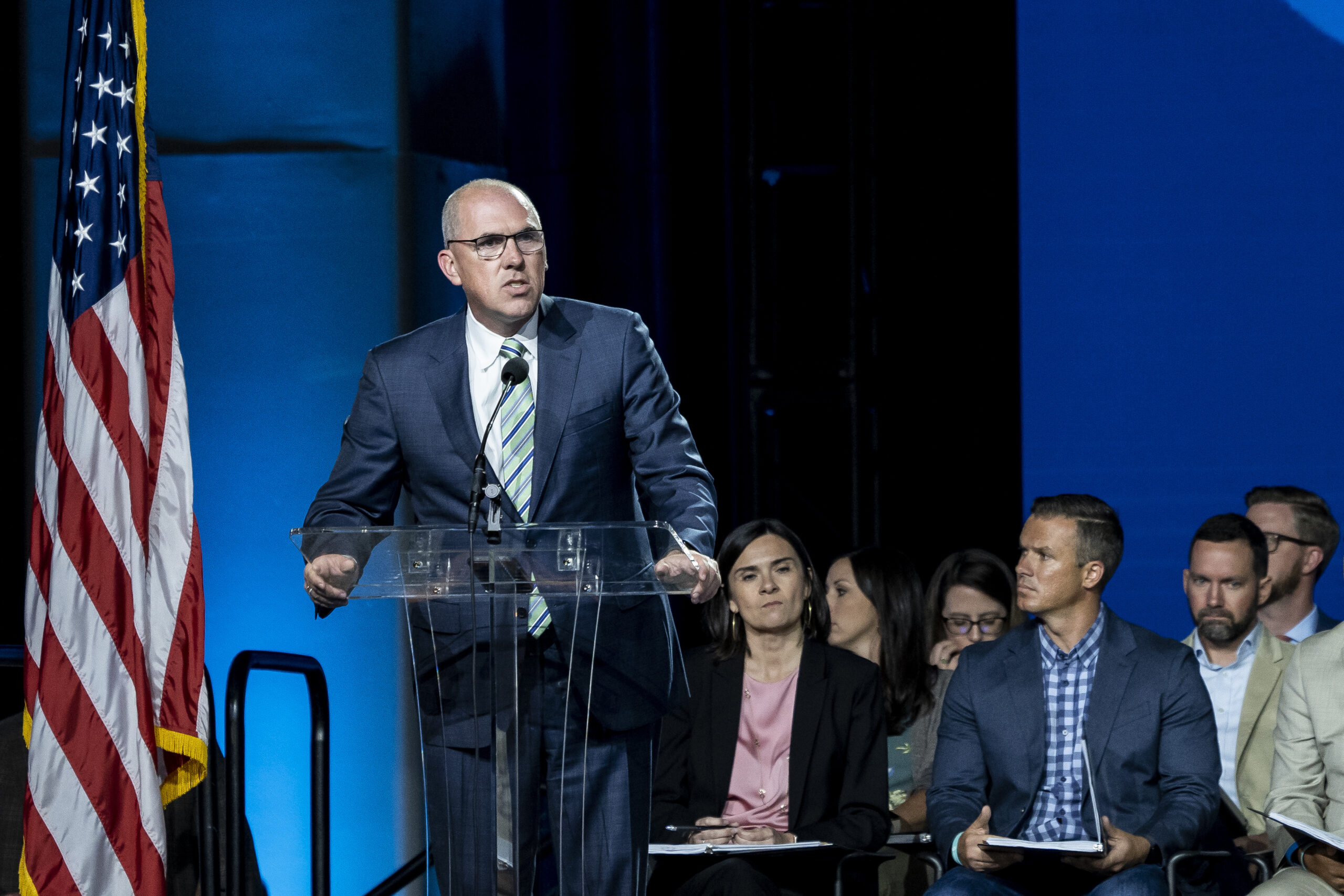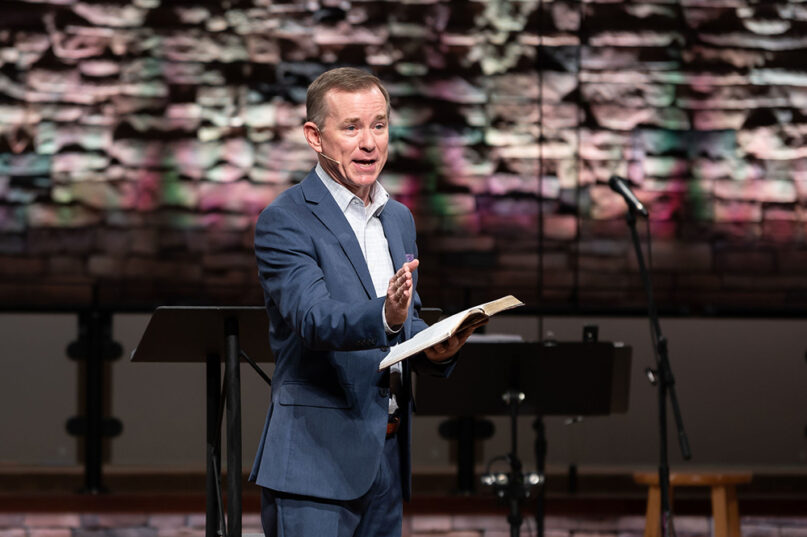(RNS) — For only the second time in more than three decades, a Southern Baptist Convention president will face a challenge for reelection.
Georgia pastor Mike Stone, who lost a hotly contested election in 2021, announced Wednesday (April 26) that he would accept a nomination for the presidency of the nation’s largest Protestant denomination.
“I’m thankful for the godly men and women who serve our convention. And there’s a lot to celebrate in the SBC, from church planting to international missions and beyond,” Stone said in a video announcement posted on social media. “And while I have no desire to disparage anyone, there are also serious causes of grave concern.”
Here is hope for SBC. So grateful for my friend @PastorMikeStone pic.twitter.com/Vg2L86oS84
— mac brunson (@macbrunson) April 26, 2023
Stone will challenge Texas pastor Bart Barber, who was elected last summer. Barber was announced as a candidate for a second term earlier this year.
In a volunteer role, SBC presidents serve a one-year term. Most have been elected to a second term, usually running unopposed. This year’s election will be held during June’s SBC annual meeting in New Orleans.
The last sitting SBC president to face a challenge was Georgia pastor Bryant Wright, who was president from 2010 to 2012. In 2011, California pastor Wiley Drake ran against Wright and got less than 5% of the vote.
In 1989, during an SBC conflict between conservatives and moderates, Georgia pastor Daniel Vestal, who was a moderate, ran against then-President Jerry Vines. Vines won the election, gaining 10,754 votes, according to the SBC’s annual report from that year. Vestal received 8,248 votes.
“It is not customary in Southern Baptist life for one announced nominee for office to comment upon another nominee’s announcement,” Barber said in a text message, “and I do not wish to violate that protocol, other than to wish Mike Stone well as a brother in Christ and to trust the outcome to the Lord and to the messengers.”

Pastor Bart Barber speaks during the Southern Baptist Convention annual meeting in Anaheim, California, on June 14, 2022. RNS photo by Justin L. Stewart
If elected, Stone said he would focus on addressing sexual abuse in the SBC by equipping local churches to better deal with cases of abuse. He also said he’d start a national evangelism program called “Crossover America” to reverse years of declining church attendance.
Once a denomination with 16.3 million members, the SBC has declined by more than 2 million members since 2006.
“Southern Baptists must turn our eyes to the evangelistic harvest field,” he said.
In a phone interview, Stone said the SBC already runs a “Crossover” branded event, which often involves door-to-door evangelism just prior to its annual meeting. Stone said he would like to expand that outreach on a national level and over a longer time period at churches across the country.
The idea, he said, is that the efforts of local churches could be supported by national advertising and other resources.
He also said he initially said no when asked to run again for president. But through prayer and discussions with leaders at his church, he changed his mind.
“I did not see this coming,” he said.
Pastor of Emmanuel Baptist Church in Blackshear, Georgia, Stone has been closely allied in the past with the Conservative Baptist Network, which has accused current SBC leaders of becoming too liberal. Candidates backed by the CBN have lost the last two presidential elections.
Stone was also an outspoken critic of former SBC ethicist Russell Moore and twice backed investigations against Moore while serving on the denomination’s Executive Committee. Stone and other critics worried Moore’s criticism of Donald Trump and other statements had caused disruption in the convention. In a letter that became public after he left the SBC, Moore complained his opponents in the SBC wanted him to “live in psychological terror.”
The Georgia pastor sued Moore for defamation in 2021, saying Moore’s comments had caused him emotional distress and hurt his chance of becoming SBC president. That suit was later dropped.
In his video announcement, Stone said the SBC was on an “unsustainable” path, citing an audit report from earlier this year. That audit report showed the denomination’s Executive Committee’s reserves had declined by $6 million, largely due to the cost of responding to a sex abuse crisis.
“Now, to be clear, people are infinitely more valuable than financial resources, but we can address this issue wisely in a way that doesn’t lead us into financial ruin,” he said in the video. “For Southern Baptists, unsustainable should be unacceptable.”
Stone revealed in 2019, during a meeting of the SBC’s Executive Committee, that he was a survivor of sexual abuse as a child.
A 2021 report from Guidepost Solutions alleged that Southern Baptist leaders mistreated survivors of abuse for years and intentionally downplayed the issue of abuse for decades.
Stone was named in the Guidepost report, for allegedly helping a former college roommate and pastor apologize for allegedly sending “text messages and photographs that were sexually suggestive” to a woman he was counseling. According to Guidepost, witnesses who had seen the text said “the apology made by the pastor was not accurate, and that the survivor was blamed.”
“The witnesses stated that they felt intimidated by Mr. Stone for bringing the pastor’s behavior to the attention of the deacons in the church,” according to Guidepost.
Stone said the allegations in the Guidepost report were false and said he wanted to prevent other pastors from having to face false allegations.
Stone has also been critical of Guidepost for the consulting firm’s support of LGBTQ rights, especially after a task force charged with implementing abuse reforms announced it would be hiring Guidepost to set up a database of abusers.
“I believe this decision poses an existential threat to our cooperative efforts as a convention,” he wrote in criticizing the decision. The committee later announced it was looking for alternative firms.
While not mentioning Guidepost by name, Stone called for a different approach to dealing with abuse, one that left matters in the hands of churches.
“We need leaders who will guide us to care well for victims while at the same time embracing scriptural principles of due process and the handling and publishing of accusations,” he said. “Leaders that honor biblical ecclesiology. And when outside help is necessary, they’re committed to only use those that are driven by facts and informed by the truth.”
A previous version of this story misidentified Guidepost. The story has been updated.





